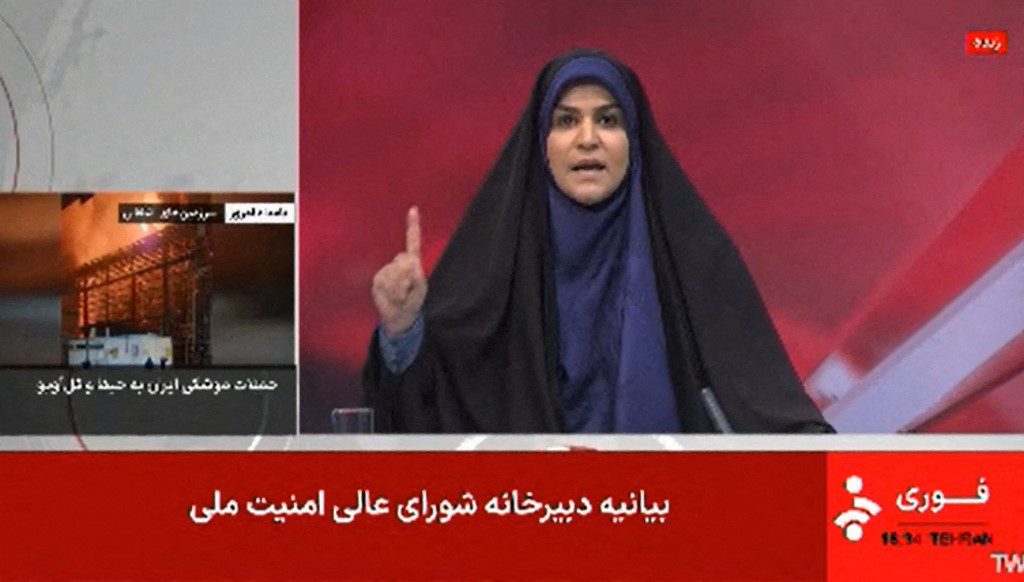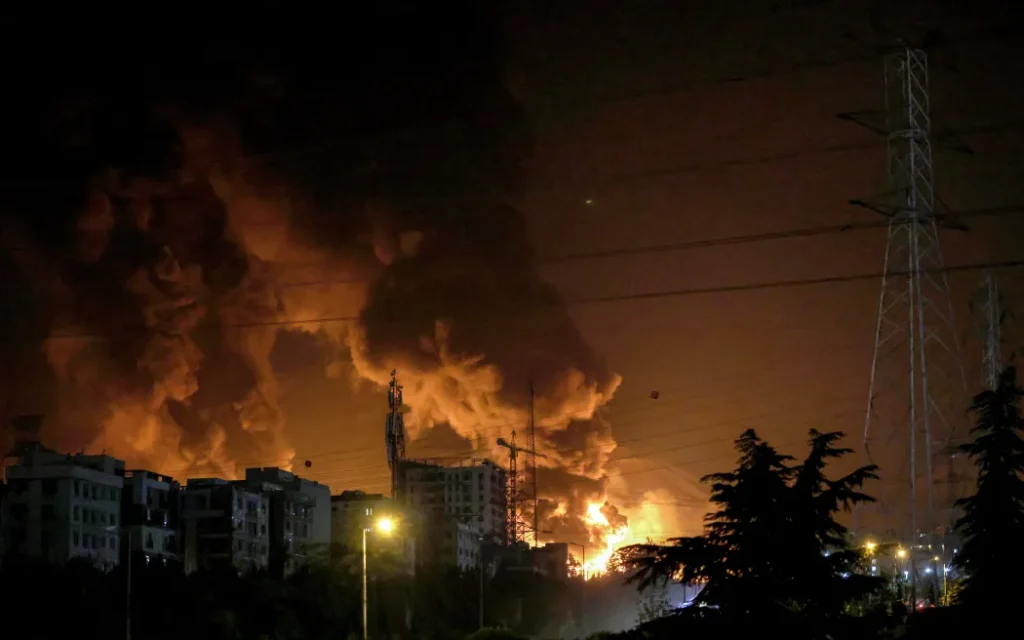An Israeli airstrike damaged Iran’s state broadcasting facility on Monday as Tehran appealed to President Donald Trump to pressure Israel into halting their escalating aerial conflict, which has entered its fifth day with mounting casualties on both sides.

Israel confirmed it targeted Iran’s broadcasting authority late Monday, with footage showing a newsreader quickly evacuating her position as an explosion struck the building. The Israeli military stated the facility also functioned as a communications center utilized by Iranian armed forces.
The conflict intensified on Tuesday as air raid sirens sounded in Tel Aviv shortly after midnight, signaling additional Iranian missile launches toward Israeli targets. Iran has reported more than 224 deaths, predominantly civilians, while Israel has confirmed 24 fatalities, all civilians.
Iranian Foreign Minister Abbas Araqchi conveyed to four European counterparts that Iran remained committed to diplomatic solutions while currently focused on responding to what it characterizes as Israeli aggression, according to Iranian state media reports. Israel has declared its objective as eliminating Tehran’s capacity to develop nuclear weapons.
Sources familiar with the diplomatic efforts told Reuters that Tehran has approached Oman, Qatar, and Saudi Arabia to persuade Trump to leverage his influence over Israeli Prime Minister Benjamin Netanyahu for an immediate ceasefire. In exchange, Iran indicated willingness to demonstrate flexibility in nuclear negotiations, according to two Iranian and three regional sources.
Araqchi emphasized the diplomatic stakes in a social media post, stating that if Trump genuinely supported diplomacy and sought to end the war, the next steps would be crucial. “Israel must halt its aggression, and absent a total cessation of military aggression against us, our responses will continue,” he wrote. “It takes one phone call from Washington to muzzle someone like Netanyahu.”
When asked about potential negotiations if Trump desired them, Netanyahu told reporters that Israel remained committed to eliminating threats from both nuclear weapons and ballistic missiles. “If this can be achieved in another way, fine. But we gave it a 60-day chance,” Netanyahu said.
Trump had previously told Reuters on Friday, the first day of Israel’s assault, that he had provided Iran with 60 days to reach an agreement halting uranium enrichment, but that deadline had expired without a deal. Scheduled talks between the United States and Iran, hosted by Oman for Sunday, were cancelled as Tehran declared it could not negotiate while under attack.
Iranian media reported that Iran was preparing for its “largest and most intense missile attack” yet against Israel, targeting military and intelligence installations.
The Israeli air campaign began with a surprise attack that eliminated nearly the entire senior leadership of Iran’s military command structure and its prominent nuclear scientists. Israel now claims control of Iranian airspace and has announced plans to escalate operations in coming days.

Israeli forces reported striking Iranian F-14 fighter aircraft at Tehran airport on Monday. The airstrikes have disabled at least two of Iran’s three operational uranium enrichment facilities, dealing significant damage to the country’s nuclear infrastructure.
Rafael Grossi, director general of the International Atomic Energy Agency, told the BBC on Monday that approximately 15,000 centrifuges operating at Iran’s largest uranium enrichment plant at Natanz were likely severely damaged or destroyed due to power disruptions caused by Israeli strikes. He noted that the separate Fordow facility had sustained very limited or no damage.
For the first time in decades of shadow warfare and proxy conflicts, Iran launched missiles directly from its territory that successfully penetrated Israeli defenses in significant numbers, killing Israelis in their homes. Television coverage showed Israeli rescue teams working through debris of destroyed residential buildings.
Israeli Finance Minister Bezalel Smotrich reported that nearly 3,000 people have been evacuated from their homes since Iranian strikes commenced, with 24 buildings scheduled for demolition due to damage sustained in the attacks.
Iranian state television broadcast images of collapsed government buildings, burned vehicles, and damaged streets throughout Tehran. Many residents attempted to flee the capital, describing long queues at gas stations and bank machines depleted of cash.
Gholamreza Mohammadi, a 48-year-old civil servant in Tehran, described the terror experienced by civilians. “I am desperate. My two children are scared and cannot sleep at night because of the sound of air defense and attacks, explosions. But we have nowhere to go. We hid under our dining table,” he told Reuters by telephone.
Trump has consistently maintained that the Israeli assault could conclude rapidly if Iran accepted U.S. demands for strict limitations on its nuclear program. Speaking to reporters on the sidelines of the G7 summit in Canada, Trump expressed confidence in reaching an agreement.
“As I’ve been saying, I think a deal will be signed, or something will happen, but a deal will be signed, and I think Iran is foolish not to sign,” Trump stated. “I think Iran is basically at the negotiating table,” he added without providing additional details.
Iranian lawmakers floated the possibility of withdrawing from the nuclear non-proliferation treaty on Monday, a move that would likely complicate any future negotiations. Iran has consistently maintained that its nuclear program serves peaceful purposes, though the IAEA declared last week that Tehran was violating its treaty obligations.
Before dawn Monday, Iranian missiles struck Tel Aviv and Haifa, killing at least eight people and destroying residential properties. Iran’s Revolutionary Guards claimed the latest attack employed new tactics that caused Israel’s multi-layered defense systems to target each other, allowing missiles to penetrate protective barriers.
The Bazan energy group, based in Haifa, reported significant damage to its power station in an attack that killed three employees and forced the shutdown of refinery operations. The facility’s closure highlighted the conflict’s impact on critical infrastructure.
Oil prices declined one dollar per barrel on Monday in volatile trading following reports of Iran’s diplomatic overtures, raising possibilities of a ceasefire and reducing concerns about disruptions to regional crude oil supplies.
The elimination of numerous Iranian military commanders and the apparent loss of airspace control represents potentially the most significant challenge to Iran’s clerical leadership system since the 1979 Islamic Revolution. The conflict has exposed vulnerabilities in Iran’s defense capabilities while demonstrating Israel’s air superiority in the region.
The diplomatic efforts through Gulf intermediaries reflect both sides’ recognition of the conflict’s escalating costs and the international community’s concern about regional stability. Trump’s role as a potential mediator has become central to ceasefire discussions, with Iran betting that American pressure could restrain Israeli military operations.
The nuclear dimension adds complexity to the crisis, as Israeli strikes on enrichment facilities have set back Iran’s uranium production capabilities while potentially strengthening arguments for international intervention. The conflict’s resolution may ultimately depend on balancing immediate ceasefire demands with longer-term nuclear containment objectives.



